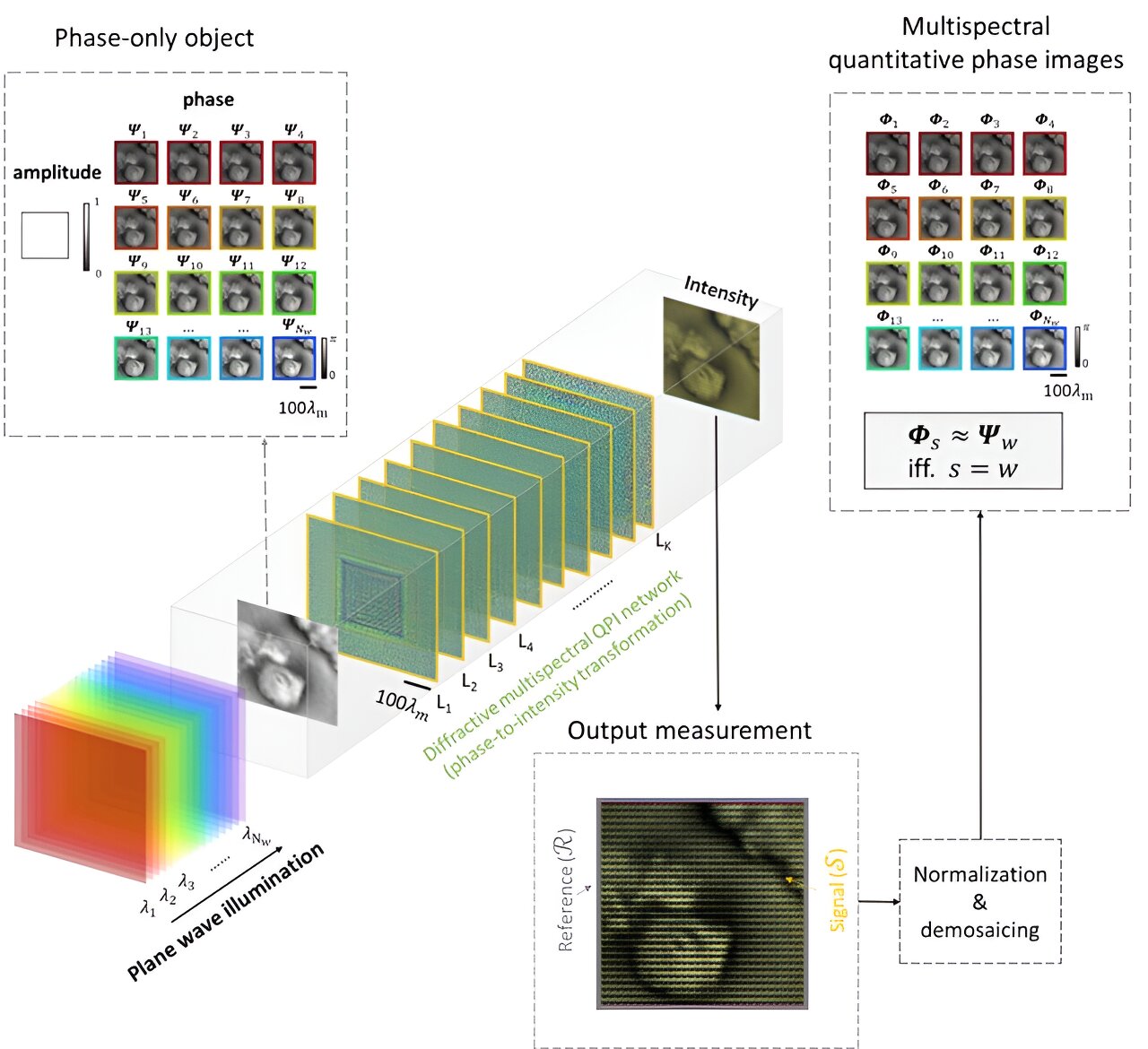Multispectral quantitative phase imaging using a diffractive optical network. Credit: Ozcan Lab @ UCLA.
Quantitative Phase Imaging (QPI) is a label-free imaging technique that leverages the optical path length information in transparent samples to evaluate their refractive index distribution and thickness variations. Multispectral QPI systems extend this principle, capturing multiple phase images across various spectral bands of interest. This functionality enables the study of spatial refractive index variations and dispersion characteristics of transparent samples such as cells.
In a study published in Advanced Intelligent Systems, a research team led by Professor Aydogan Ozcan from the Electrical and Computer Engineering Department at the University of California, Los Angeles (UCLA) introduced a new design for multispectral QPI.
This design harnesses deep learning to engineer a broadband diffractive optical network, enabling the acquisition of quantitative phase images across various spectral bands within a single snapshot. The optical network utilizes several spatially structured dielectric diffractive layers, each comprising hundreds of thousands of deep learning-optimized diffractive features that are transmissive.
After the fabrication of the resulting diffractive layers, the optical network functions as an all-optical phase-to-intensity transformer, extracting the phase profiles of the input objects at pre-determined wavelengths by optically routing the multispectral QPI signals onto designated spatial positions at the output plane, where a monochrome focal plane array measures the resulting intensity distributions. On this focal plane array, the pixels at the signal region are grouped in an interleaved manner, with each group measuring the QPI signal corresponding to a specific target spectral band.
Based on this innovative design, the UCLA team conducted numerical simulations to showcase the efficacy of their diffractive multispectral quantitative phase imager. They presented the capability of this system to simultaneously perform QPI across 16 distinct spectral bands in the visible spectrum of light while maintaining a consistent performance across all wavelengths.
Moreover, they validated the generalization ability of their diffractive phase imager design by successfully imaging new types of objects never seen before, including the images of human cells. These numerical analyses underscore the system’s potential as a versatile, general-purpose multispectral quantitative phase imager suitable for various applications.
These diffractive multispectral QPI processors are promising for integration with monochrome optoelectronic sensor arrays covering different spectral regions. Such an integrated system could create compact, high-performance multispectral phase imaging systems, which might be useful for numerous applications, including biomedical imaging, material science, and environmental monitoring.
This research was led by Dr. Aydogan Ozcan, the Chancellor’s Professor and the Volgenau Chair for Engineering Innovation at UCLA, and an HHMI Professor with the Howard Hughes Medical Institute. The other authors include Che-Yung Shen, Jingxi Li, and Deniz Mengu, all from the UCLA Electrical and Computer Engineering Department.
More information:
Che-Yung Shen et al, Multispectral Quantitative Phase Imaging Using a Diffractive Optical Network, Advanced Intelligent Systems (2023). DOI: 10.1002/aisy.202300300
Provided by
UCLA Engineering Institute for Technology Advancement
Citation:
Diffractive optical network enables multispectral quantitative phase imaging in a snapshot (2023, September 4)
retrieved 5 September 2023
from https://techxplore.com/news/2023-09-diffractive-optical-network-enables-multispectral.html
This document is subject to copyright. Apart from any fair dealing for the purpose of private study or research, no
part may be reproduced without the written permission. The content is provided for information purposes only.




